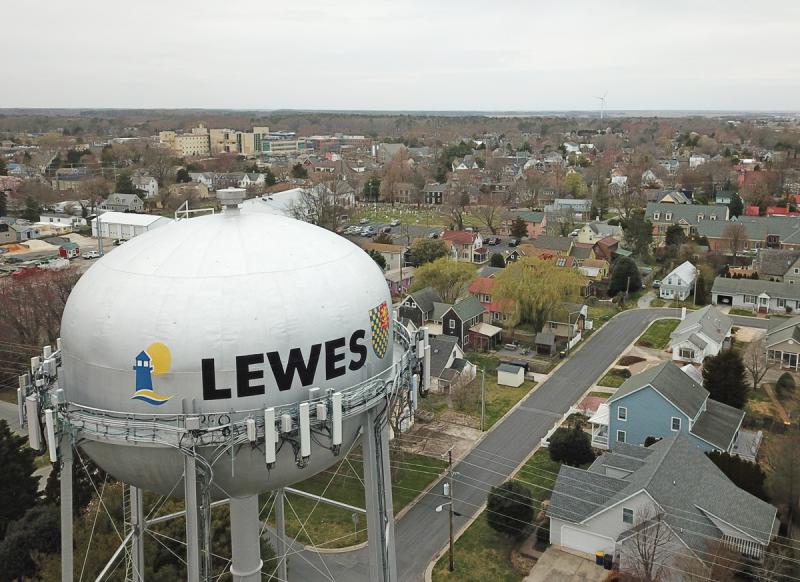The years-long, expensive and sometimes contentious feud between Lewes Mayor and City Council and the Lewes Board of Public Works is over.
After years of negotiations, both sides unanimously agreed to amend the BPW’s charter to add two new sections. The first will require BPW to get mayor and city council consent before expanding utility service to any territory outside city limits. The second change will provide the BPW the power to sue and be sued, with the caveat that it cannot sue or be sued by the city for at least five years.
The charter amendments address issues that were at the heart of the disagreement. After sparring over the legality and enforceability of requiring potential BPW customers to agree to future annexation, the BPW sued the city in July 2019. A year and a half later, the lawsuit was dismissed by Superior Court Judge E. Scott Bradley on the basis that the BPW does not have the power to sue or be sued.
The charter change will give the board that power, while resolving the issue of requiring a pre-annexation agreement for customers receiving utilities outside city limits.
The two sides also agreed to a memorandum of understanding to establish a cohesive and cooperative working relationship moving forward.
“This MOU is a document that is aspirational in some ways for us to work together and provides many vehicles to do that in a collaborative and productive way, and put issues we’ve been dealing with to rest,” said Mayor Ted Becker at a June 18 city council meeting.
BPW President Pres Lee agreed.
“Unfortunately, this has taken a long time,” he said. “I appreciate the hard work and determination to get this done. I’m looking forward to getting back to the way it used to be.”
The MOU includes several items that were agreed to during negotiations. In addition to the charter amendments, the document establishes a policy whereby the city and BPW will not impose certain fees on each other. The city will reestablish a capital projects committee and include representation from the BPW, which has not happened in the past. Together, the city and BPW can better coordinate infrastructure projects.
The two sides also agreed to jointly title several properties in town, including the wastewater treatment facility parcel on American Legion Road.
Newest BPW Director Richard Nichols, who focused much of his campaign on the public’s distrust of the BPW due to the feud and the December 2019 discharge incident at the wastewater treatment facility, applauded the end of a dark chapter.
“I think this MOU reflects very careful and studied communication with mayor and city council as well as our own team, and it achieves what I think the public wanted, which was to make a settlement, make nice and keep moving,” he said at the June 21 BPW meeting.
BPW Director Tom Panetta was unable to attend the June 21 meeting, but sent a letter in support of the charter changes and MOU. Panetta was part of the BPW’s negotiation team.
“The documents before us are not perfect, but a result of a lot of give and take,” he said. “It’s a foundation to rebuild trust. The public’s voice was heard, and we will work harder to listen to you.”
Becker and Lee each thanked Sen. Ernie Lopez, R-Lewes; Rep. Steve Smyk, R-Milton; and Speaker of the House Rep. Pete Schwartzkopf, D-Rehoboth Beach, for working with each side to find common ground during negotiations.
In order for the charter amendments to become official, they must be approved by the General Assembly in Dover. City and BPW officials have asked that the matter be considered during this legislative session, which ends Wednesday, June 30. The bill was introduced June 23 by Lopez, Schwartzkopf and Sen. Bryan Townsend, D-Newark/Bear. It received unanimous approval by the Senate and will soon go before the House.
The feud has not been cheap for taxpayers and ratepayers, as the city and BPW combined have paid about $400,000 in legal fees over the last two-and-a-half years.
Peter lawsuit
As the two sides were finally working out their differences, Court of Chancery Vice Chancellor Sam Glasscock III ruled against the BPW June 17 in its motion to intervene in a lawsuit filed by the City of Lewes against New Road resident Jerry Peter Jr.
Lewes officials filed the lawsuit in May 2020, seeking an injunction to stop Peter from obtaining sewer service from the BPW unless he signed a pre-annexation agreement. After the lawsuit was filed, Peter also agreed to hook into the BPW’s water system.
Peter’s 1.87-acre property fronting New Road is surrounded on three sides by Lewes boundaries, but it remains in Sussex County jurisdiction. It cannot be accessed without traveling through a portion of Lewes, but Peter does not want his property annexed.
In February, with the lawsuit still unresolved and connection to Peter’s property imminent, Lewes City Solicitor Glenn Mandalas filed a motion for a temporary restraining order to stop Peter from hooking up. Glasscock denied the motion March 3, and Peter connected to the system a few days later.
Also in March, Glasscock appointed a third-party attorney to represent the public. In May, attorney Charles E. Davis of Saul Ewing Arnstein & Lehr determined that the pre-annexation agreement would not necessarily be illegal, but would be problematic. Davis recommended the court not issue the declaration the city seeks in the case.
The city’s case against Peter continues, though, as Glasscock has yet to rule on a motion to dismiss the case, filed by Peter’s attorney Tim Willard, or the city’s motion for summary judgment, filed by the city’s attorneys.
Willard said he believes Peter was caught in the middle of a power struggle between the city and BPW, costing his client a lot of money to defend his position.
“It appears that the city and BPW have resolved their issues by going to the General Assembly, which is what my client maintained in the motion to dismiss should have happened from the beginning,” Willard said. “This case was always a public policy issue, and my client never have should have been sued. The city's choice of litigation has cost my client, not to mention the people of Lewes, significantly, and the outcome was foreseeable.”
MOU details
- BPW charter to be amended to require city’s consent before extending utility services to areas outside corporate boundaries of Lewes
- BPW charter to be amended to provide BPW general authority to sue and be sued. It also will prohibit either the city or BPW from suing the other until July 1, 2026
- BPW agrees to comply with city’s building and street repair permitting requirements. The city agrees to not charge BPW a building/construction permit fee and not charge for city inspections. BPW agrees to not charge the city plumbing permit and inspection fees
- City agrees to reestablish capital projects committee and include BPW representation
- BPW agrees to not charge city fees directly related to construction of public restroom and shower facilities. BPW agrees to not charge the city fees directly related to construction of facilities “beneficial” to city residents and visitors
- BPW agrees to review stormwater fee structure
- BPW agrees that property purchased for use by BPW within the city shall comply with zoning regulations
- City and BPW shall collaborate on master plan for Schley Avenue properties between Franklin and Washington avenues
- If the city adopts an ordinance requiring the use of porous pavement in the flood zone, BPW agrees to install porous pavement for applicable street rehabilitation projects. The city and BPW shall share the cost of street vacuuming and other cleaning activities
- The city and BPW shall prepare and record new deeds jointly titling several properties
- The city shall review the current lease agreement for BPW’s office space and adjust rate to be consistent with market rate for similar properties
- The city shall collaborate with BPW to improve seasonal street sweeping and leaf collection to minimize clogging of stormwater management system
- The city shall implement measures to ensure its use of the BPW’s parking area is minimized during business hours
- The MOU shall be reviewed and renegotiated, and the parties shall agree on a new agreement to apply going forward prior to July 1, 2026.
Nick Roth is the news editor. He has been with the Cape Gazette since 2012, previously covering town beats in Milton and Lewes. In addition to serving on the editorial board and handling page layout, Nick is responsible for the weekly Delaware History in Photographs feature and enjoys writing stories about the Cape Region’s history. Prior to the Cape Gazette, Nick worked for the Delmarva Media Group, including the Delaware Wave, Delaware Coast Press and Salisbury Daily Times. He also contributed to The News Journal. Originally from Boyertown, Pa., Nick attended Shippensburg University in central Pennsylvania, graduating in 2007 with a bachelor’s degree in journalism. He’s won several MDDC awards during his career for both writing and photography. In his free time, he enjoys golfing, going to the beach with his family and cheering for Philadelphia sports teams.






















































